We leave Moscow and take a long train ride across Russia to the Black Sea
In Moscow, we were like country bumpkins, enjoying the tourist sites, waiting in line to see the embalmed body of V.I. Lenin and posing in front of famous landmarks. We photographed everything but were most impressed with the excessive width of the streets. Then it was off to the station to board the widest train we ever saw. Everything was wide !
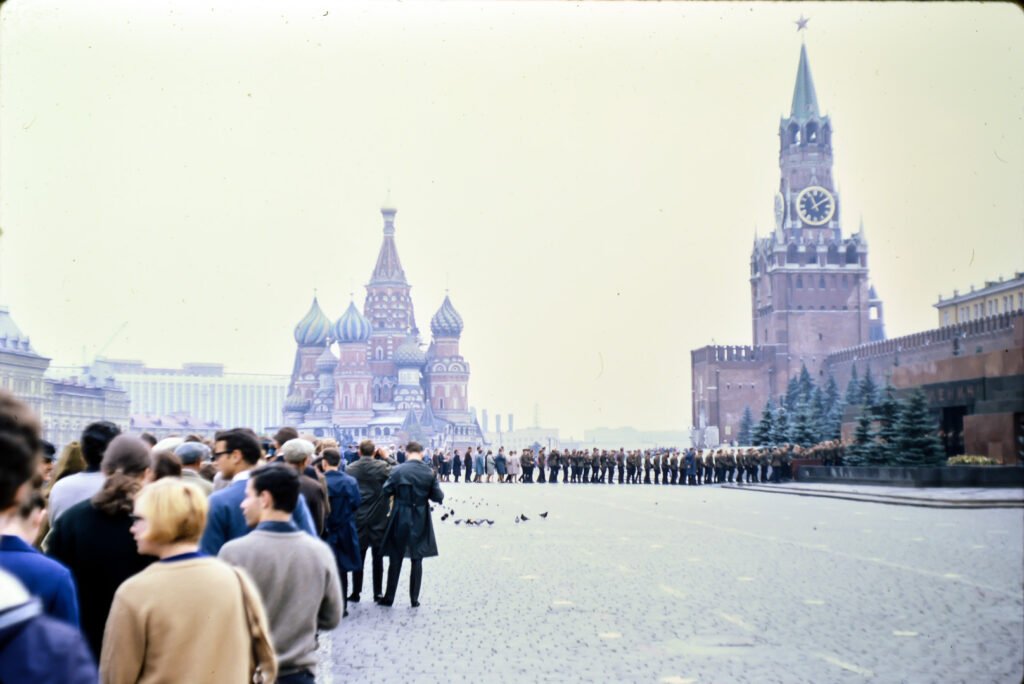
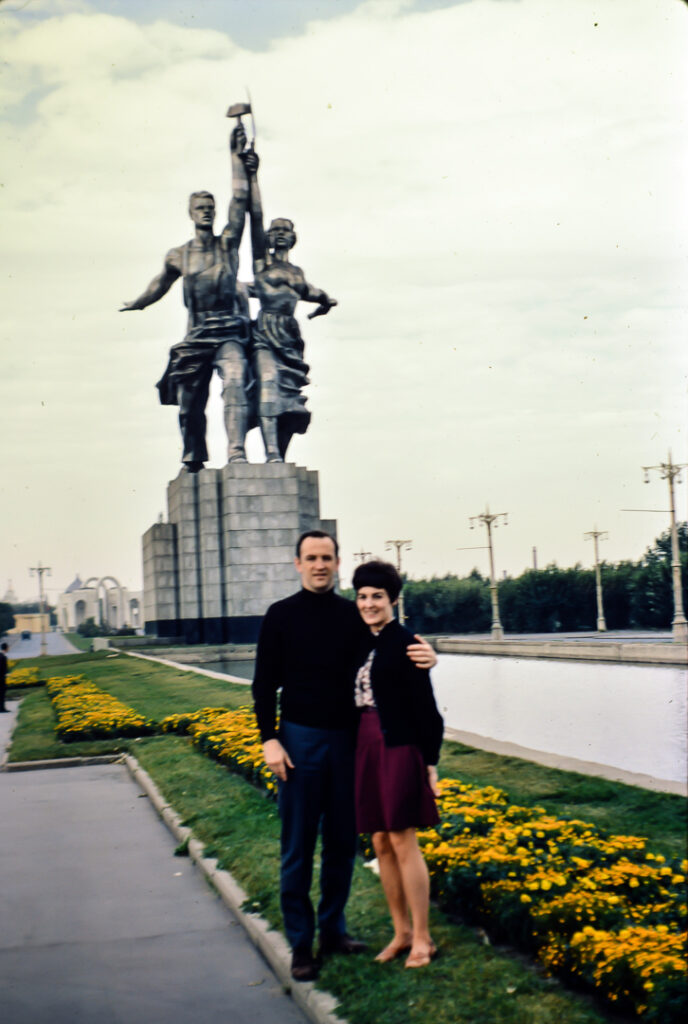
We made the journey across the Soviet Union to the Crimea in wonderfully comfortable trains travelling on wide tracks and drinking tea from glasses held in silver holders. This was the stuff from books by Paul Theroux and Bruce Chatwin and we loved it. Fortunately, we did keep diaries so I do remember certain details, like buying a watermelon through the window from a Russian peasant woman for a one ruble when the train stalled somewhere in the middle of the countryside.
When we arrived in Sevastopol on the Black Sea we had to share a room with a Russian couple who did nothing but drink vodka and sleep. As young Americans to whom this invasion of privacy was unheard of, I think we managed pretty well. Apparently, there was an overbooking of accommodation in the sanatorium where we were staying and there was nothing we could do about it. It became another fascinating part of our education.
There were some exciting elements to our visit to the Black Sea. For example, the great Russian writer Anton Chekov had a dacha on the shore which we could see in the distance. Apparently, he wrote his classic play The Three Sisters whilst holidaying here. Another vivid memory was that after taking second place in a talent contest in the resort by singing a duet from a Broadway musical, we became instantly popular with the local Russians.
Later we met a tall and beautiful Russian woman named Vera on the beach and she spoke a little English. She seemed quite intelligent, energetic and sociable. We were quite aware of the peculiar nature of the relationship between the Russians and Americans in the midst of the Cold War, so the meeting with Vera was slightly awkward. Nevertheless, there were moments. For example, I had brought with me one of the new half-dollar coins from the United States minted in 1964 which had the impression of the head of John Kennedy. We had decided that if we met someone special on this Russian trip, we would give him or her the Kennedy half dollar. One night at the bar, I decided that Vera was the person and Pat agreed. Vera took the coin, held it up to the light and burst into tears. She then went to the bar and bought a round of champagne for everyone in the place. It was the most remarkable demonstration of pure joy that I have ever seen in an adult. These were indeed memorable scenes for a young couple from New Jersey.
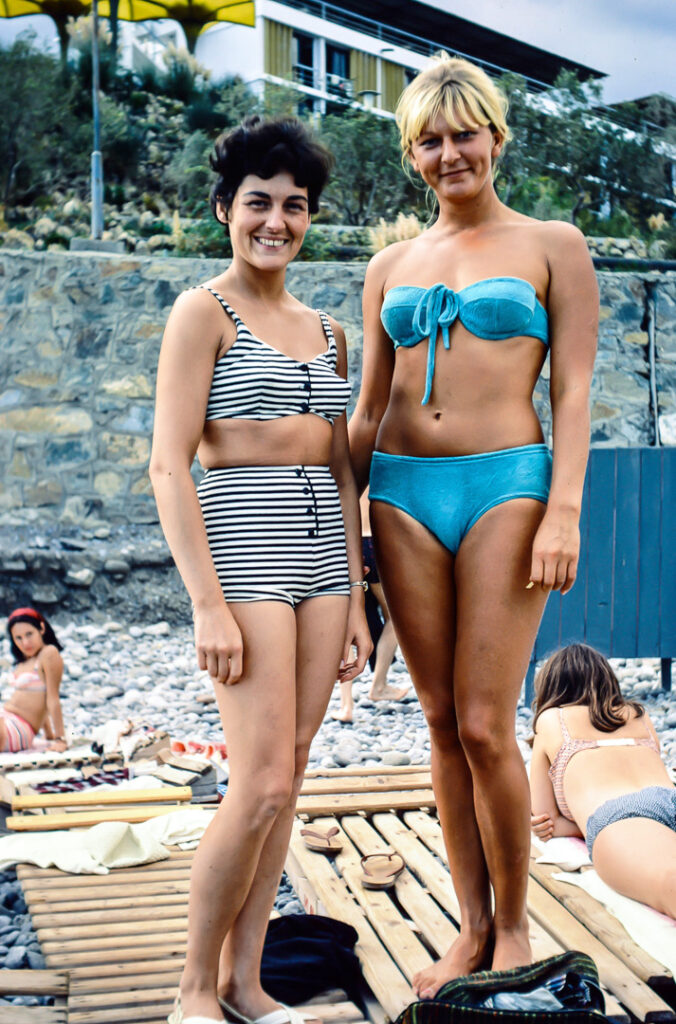
In subsequent conversations, Vera told us how much she wished she could travel abroad and had requested the authorities over and over again to visit the great cultural capitals like London and Paris. She wanted to buy books by the great Western writers which she knew had been translated into Russian. She even knew of a bookshop in Paris on the Rue de la hachette frequented by Russian emigres where one could purchase Russian translations of Ernest Hemingway, Albert Camus and James Joyce. When we parted with hugs and kisses on our way to catch the train back to London, I promised Vera that the next time we went to Paris we would purchase several of these great classics and post them to her at her flat in Moscow. She enthusiastically wrote down her address.
If the reader is wondering what this diversion has to do with the main thesis of this tale, please be patient as the meeting with Vera forms a key element in this strange saga.
We returned via Ukraine and a visit to the City of Kiev. Since I had taken on the role of organiser of the group’s activities, I was immediately attracted to the billboard announcing a concert of the music of Shostakovich in Kiev that very night. I quickly enquired about the program and was pleased to find that not only did the offerings include one of the great man’s most famous works – the 5th Symphony – but the conductor was Shostakovich himself ! It turned out that the conductor was the composer’s son, Maxim. Nevertheless, we were excited to see a 100 piece orchestra spilling off the stage in a room lit by dramatic gilded chandeliers.
In East Berlin, I fulfilled a long-held dream to enjoy a Bertolt Brecht play performed by his own company – The Berliner Ensemble. We sat in the famous theatre and watched his company perform the classic play Mother Courage and Her Children. Pat took a photo of me outside the theatre which I now treasure. Shortly after, we visited Alexanderplatz and made our way back onto the train and travelled through the notorious Friedrichstrasse boundary. A day later, strolling along the electric Kurfürstendamm after three weeks without seeing a billboard, a commercial or a sexy advert selling deodorants, lingerie or Coca Cola, we were shell-shocked by the adverts. We were in West Berlin !
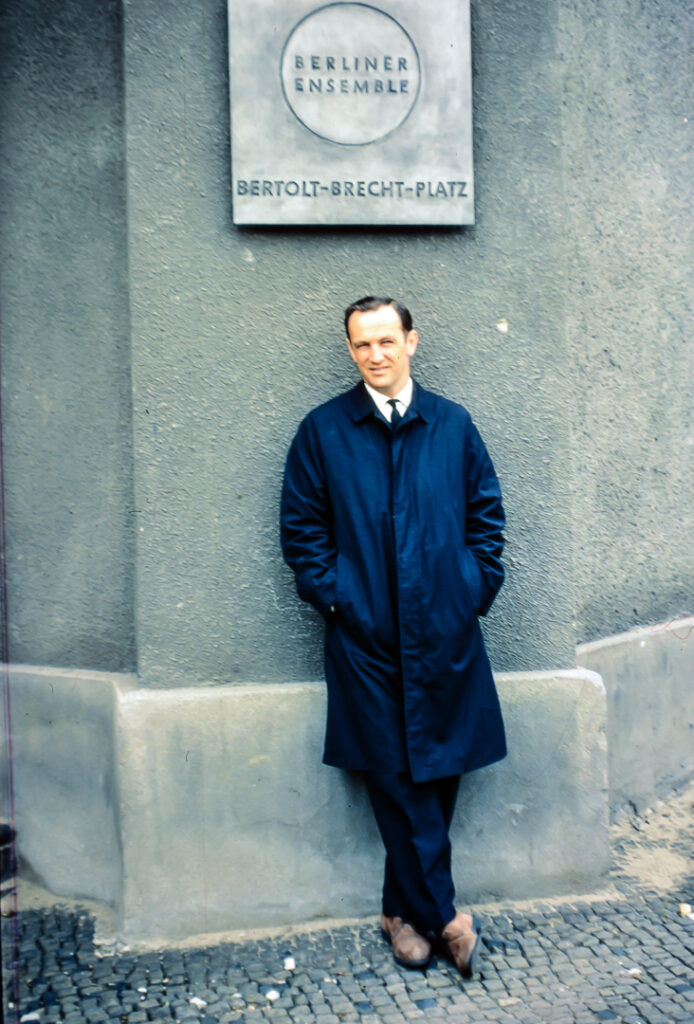
Before we knew it, we would be back in London and the trip would seem a dream. When we did get back, I was soon contacted by Alexander who wanted to know all about our trip. Of course, I gave him a glowing report and indicated that we had met some Russians whom we found to be very friendly and interesting and were pleased to have had the opportunity to do more than just attend the low temperature physics conference.
Alexander had a surprise for us. He had obtained tickets to a football match for me and Pat to attend with himself and his wife. Now this was the first time we were to meet Alexander’s wife which was quite a breakthrough. But what was the football match? This you will not believe, especially if you are a fan of international football. He had tickets (believe it or not) for the final of the World Cup match between Germany and England. So, right on schedule, Alexander and his wife pulled up in front of our flat in WC1 in a black limousine and we all travelled to Wembley Park on 30 July 1966 to witness the most important match in the history of English football.
We sat at midfield and watched, cheering for England, not at all appreciating the significance that this game for English fans. Pat proudly displayed a rosette marked ‘England’. European Football, (we would call soccer) was a whole new experience for us and one that was frankly, pretty boring. During the match, I do recall that one of the English players seemed to be getting all the goals, a man named Geoff Hurst who scored three times – a ‘hat trick’. We enjoyed the crowd, the atmosphere, and the excitement . . . but for two Americans familiar with the high-tech pro football of the NFL or even US college football, it was almost a dull game. After decades trying to get enthused about European football, it does still not compare in pure excitement to my own interest American football.
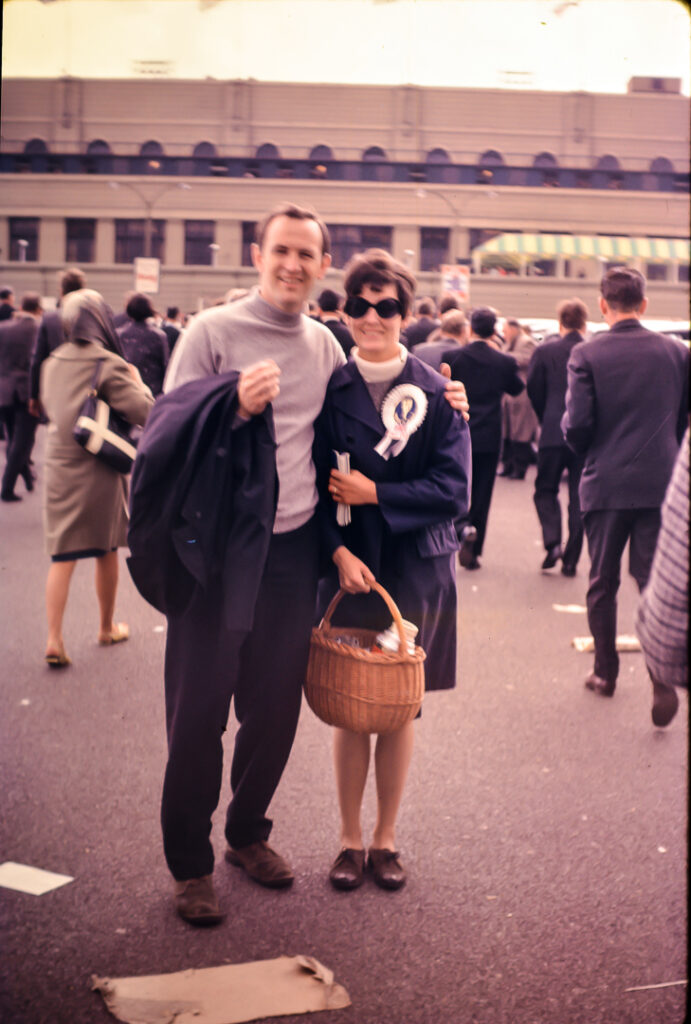
I haven’t told many of my English friends about attending the World Cup Final with my Russian friend because I am very much embarrassed that I had no sense of how important this game was for English fans. We have been to many important events both before and after this match, but as I look back now at the many anniversaries which have been celebrated on England’s greatest day in football, I am embarrassed by the lack of enthusiasm we displayed as we sat with such wonderful seats watching England defeat Germany in the replay of the two world wars earlier in the century.
Now, the new academic year was now upon us and the pressure intensified to complete my thesis, return to RCA and renew my work for the company this time with a well-earned PhD. But there was a problem. I had collected an enormous amount of data from my experiments and now I was compelled to analyse the material and put it into some sensible format . . . no easy task. The easiest way out of this challenging situation was to ignore the ordeal of the writing for now, pack everything up and return to America, promising everyone to complete the project in due course. Fortunately, I was the protégé of a marvellous physicist and most sensible colleague named George Cody from the RCA Laboratories in Princeton. During a very serious trans-Atlantic telephone conversation, he told me in no uncertain terms not to leave Britain without the PhD thesis completed. I have never received more valuable advice in my entire life ! But this is getting ahead of the story.
I refused to meet Alexander during the new academic year. He wished to bring more visitors but I refused, claiming that I was too busy. In fact, I was very bored with his company and the nosy Russian scientists photographing and drawing my apparatus and sifting through the hundreds of measurements that I had made investigating the effects of magnetic fields on superconducting metals.
Joe, I have always loved hearing these stories over many years and this is great to see it set out so clearly. What a great film this would make as Mary says! It’s wonderful to see Vera finally! Thanks so much for sharing and keep these coming – it’s wonderful family history!
What a story ! What a life ! WhAt a family ! And to imagine that I actually know you ! Amazing !
And I must add “2 World Wars and 1 World Cup … do da do da” and also the Dacras was my favourite restaurant too ! I wondered about the people and what their stories were, they looked so interesting … ha now I know why ! And the food was great !
Joe thank you for a great story … had me in the edge of my seat .. and an excellent birthday present for Mark too !
You need to write a book ! A best seller for sure ! 😘
Wow Dad! This is a pretty amazing tale…told very well! I’m glad that your run in with the CIA didn’t hamper any of you radical anti-war activties. Fearless to the max! (or should I say the ‘fearless Mac!’)
Hi Mac,
I enjoyed this outstanding and captivating report with greatest interest from my German lock down.
What a perfect story teller you are! Please go on. When are you going to publish such entertaining stories?
Best regards
R.G.
Really enjoying the tale, JoeBoy! It flows beautifully and keeps me engaged, anticipating hungrily for what is coming next!
Looking forward to more!
Joe, I can not believe this story. This is your film, your opera, your play. IT would make such a brilliant theater piece. I remember bits of the Alexander story but this story is so beautifully written and the
photographs are fabulous! Thank you…keep writing! Who shall we cast as you? hmm, Damian Lewis? and for Pat..Rachel Weisz? Let’s get Sam to direct it! xoxoMary
Just loved it! Joe, you have such a gift for storytelling (you think?). I’m sure that you could tweak your factual narrative as fiction and have another career. Go for it. You have some spare time, don’t you? Seriously, you’re good!
Very interesting Joe!
A very interesting and compelling story. I have one friend who taught in Moscow for a semester and experienced attempts by the Russians to try to compromise him by sending prostitutes to his hotel room. Fortunately he knew not to have anything to do with the offers.